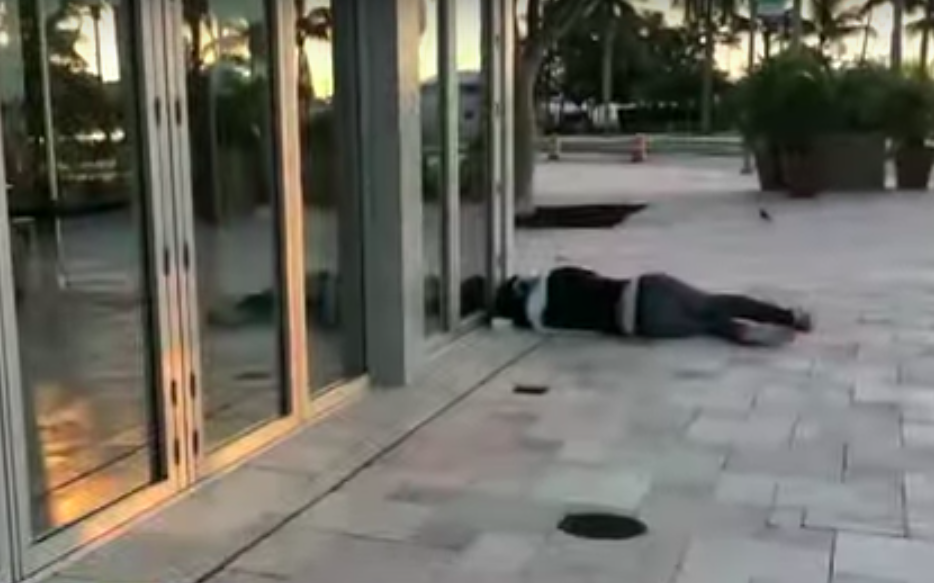
As much as little ones love to hear them some "Baby Shark" (over and over and over again), the kids' single has been slowly driving parents nuts since it first exploded on YouTube a few years ago. And now, it's apparently being used as a weapon of defense in West Palm Beach, Florida, where park officials are getting creative in battling a homelessness problem.
Waterfront Lake Pavilion has seen an uptick in overnight guests, who congregate around one of the main buildings at night, according to CNN.
To try to discourage people from sleeping there, the park has started playing "Baby Shark" as well as other popular children's songs all night long.
In a statement sent to the outlet, city spokeswoman Kathleen Walter said the overall goal is to "encourage people to seek safer, more appropriate shelter," and notes that the city is just testing it out.
"The music volume complies with city code," she explained, "and is a temporary measure, as we are exploring the possibility of having set hours for the Great Lawn and Pavilion."
'Baby Shark' isn't the only song the city is blasting, either -- apparently, a litany of other irritating children's songs are being played too.
Another choice tune on the playlist? "Raining Tacos" (which if you haven't heard yet, consider yourself lucky).
Of course, not everyone is pleased. In fact, many find the measure to be downright cruel.
Those against the measure think that if you really want to solve a homelessness problem, maybe you should adopt measures to actually solve the problem, such as actually helping the people seeking out makeshift beds in a park in the middle of the night, instead of driving them out with incessant music, which will only shift their location.
Megan Hustings, interim director of the National Coalition for the Homeless, told CNN that the whole thing "shows a lack of concern for our community members who are struggling through a very tough time."
"Responding with this kind of discrimination and disgust instead of compassion is … really immoral. It's disturbing," Hustings continued. "We're all humans, and we need to sleep."
On Twitter, many people voiced their disgust with the measure.
"How nice, combat homeless with psychological tactics," wrote one user.
"Splendid sense of compassion," wrote another.
"Have they tried building affordable shelter?" another tweet asked.
Others wondered aloud whether this was really such a huge "problem" to begin with.
"Surely there are more important matters that are deserving of attention, more so than torturing the damn homeless," tweeted one man.
Although some did see some humor to it, many just found the whole thing disheartening.
"Not sure if the aim is to be a funny story but it is sad in every way conceivable," tweeted another user.
And that's just it: At first glance, this story sounds rather comical. Until you get to thinking about the people who are effectively being "chased out" of a quiet place to sleep, when they feel they have nowhere else to turn. Although loitering and crime are very real issues cities have to deal with, surely those creative thinking skills could be put to use coming up with better shelter options for the homeless.
Believe it or not, though, this isn't the first time a city has taken such a tactic.
In 2012, New York's Port Authority Bus Terminal, initiated a similar practice. The terminal, which acts as a transportation hub for those traveling between New York and New Jersey, started playing Mozart and other classical music over the loudspeaker at night to deter the homeless from taking up residence there. In 2016, a San Francisco Burger King did the same to help clear a nearby busy street corner.
In fact, classical music has been used to deter loitering — and, by extension, crime — in public libraries, bus stations, subways, and more. And not just for the homeless, but also for groups of teens.
A 2009 study by the Seattle Times found that it might have something to do with "people's neurobiological responses to things they don't enjoy or find unfamiliar."
"When people hear music they don't like, their brains suppress the production of dopamine — a neurotransmitter that regulates pleasure and other emotions — which puts a damper on their spirits," explains a piece by the Los Angeles Times on the subject. (Ahhh, so THAT'S what's happening when we hear kids' songs on repeat … )




